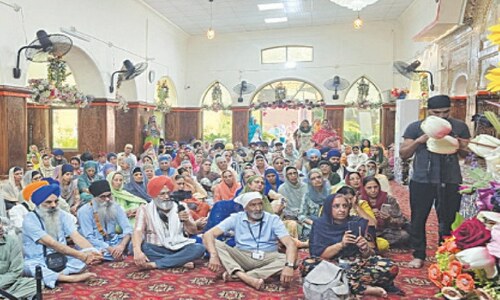GUJRAT: Hundreds of cutlery and stainless utensils manufacturers have sought the government’s help for the revival of Pakistan Cutlery Institute (PCI) in Wazirabad as well as the industry’s shift towards automation from manual manufacturing.
Wazirabad houses at least 3,000 small and medium units manufacturing cutlery and stainless utensils, which have a huge potential for growth in exports. However, a lack of skilled human resource and issues of capacity building have been a major hurdle in the industry’s growth.
There are at least 400 medium scale units manufacturing various cutlery items, around 1,500 small and at least 1,000 other units. At least 25,000 people are associated with this business mainly in Wazirabad and its surrounding areas.
Moreover, educated youth from Wazirabad, Gujranwala, Sialkot, Gujrat, Karachi, Multan, Faisalabad and Lahore have in the last few years set foot into the export business of these items through e-marketing.
The industry is divided into tableware (spoon, fork and knife etc) and hunting daggers such as swords, daggers, pocket knife, butcher knife and kitchen knife. However, the “Damascus knife” made by several manufacturers in Wazirabad for export has a special demand in various countries.
Haji Naseer Ahmed, the Pakistan Cutlery and Stainless Utensils Association chairman, said currently the sector was exporting products worth around $100 million annually, but had the potential to go up to $300 million. To meet this huge potential, the industry required the government’s support for shifting towards automation.
Export orders, he said, had grown in the last few years after China shifted to modern technology that increased its manufacturing cost.
Hamza Shakeel Bhutta, a former chairman of the association, said the industry did not have the capacity to meet its rising export orders, while lack of skilled human resource was also a major issue. To attract the young generation to work in the industry, he said, the PCI should be revived through provision of latest machinery and other expenses. The institute had been lying dysfunctional for at least seven years and offered training courses to the youth.
Khalid Mughal, chairman of the Cluster Development Programme Board of Management, said the revival of the CPI had been taken up with the federal government for which the industries ministry had prepared a project of Rs200 million, but it was yet to be executed.
He acknowledged that the local manufacturers were unable to run the CPI on their own, as it was a cottage industry that lacked financial resources for such projects. The government’s help was imperative to run such institutes.
As per an agreement between the government and the cutlery association in 2013, the Small and Medium Enterprises Development Authority had launched the CPI for a year and the industry had to run it with its own resources after that. But it was closed in 2014 due to shortage of funds.
Published in Dawn, January 19th, 2021















































Dear visitor, the comments section is undergoing an overhaul and will return soon.